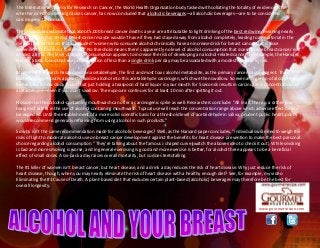
Alcohol and your breast
- 1. The International Agency for Research on Cancer, the World Health Organization body tasked with collating the totality of evidence as to whether or not something causes cancer, has now concluded that alcoholic beverages—all alcoholic beverages—are to be considered carcinogenic to humans. The researchers estimate that about 5,000 breast cancer deaths a year are attributable to light drinking of the best red wine, meaning nearly 5,000 women that died of breast cancer maybe wouldn’t have if they had stayed away from alcohol completely, leading to an editorial in the medical journal Breast that concluded “women who consume alcohol chronically have an increased risk for breast cancer that is dose dependent but without threshold.” No threshold means there’s apparently no level of alcohol consumption that doesn’t raise breast cancer risk at least a little. Any level of alcohol consumption appears to increase the risk of developing an alcohol-related cancer. For example, the Harvard Nurses’ Study found that even consumption of less than a single drink per day may be associated with a modest increase in risk. Most recent research has focused on acetaldehyde, the first and most toxic alcohol metabolite, as the primary cancer-causing agent. The bacteria in our mouths appear to oxidize alcohol into this acetaldehyde carcinogen, which we then swallow. So even a single sip of alcohol may be harmful. A new study found that just holding a teaspoon of hard liquor in your mouth for 5 seconds results in carcinogenic concentrations of acetaldehyde—even if you don’t swallow. The exposure continues for at least 10 min after spitting it out. No surprise then alcohol-containing mouthwash can offer a carcinogenic spike as well. Researchers conclude: “All in all, there is a rather low margin of safety in the use of alcohol-containing mouthwash. Typical use will reach the concentration range above which adverse effects are to be expected. Until the establishment of a more solid scientific basis for a threshold level of acetaldehyde in saliva, prudent public health policy would recommend generally refraining from using alcohol in such products.” So why isn’t the same recommendation made for alcoholic beverages? Well, as the Harvard paper concludes, “individuals will need to weigh the risks of light to moderate alcohol use on breast cancer development against the benefits for heart disease prevention to make the best personal choice regarding alcohol consumption.” They’re talking about the famous J shaped curve (watch the above video to check it out). While smoking is bad and more smoking is worse, and in general exercising is good and more exercise is better, for alcohol there appears to be a beneficial effect of small doses. A six-pack a day raises overall mortality, but so does teetotalling. The #1 killer of women isn’t breast cancer, but heart disease, and a drink a day reduces the risk of heart disease. Why just reduce the risk of heart disease, though, when you may nearly eliminate the risk of heart disease with a healthy enough diet? See, for example, my video Eliminating the #1 Cause of Death. A plant-based diet that excludes certain plant-based (alcoholic) beverages may therefore be the best for overall longevity. www.gourmetrecipe.com
